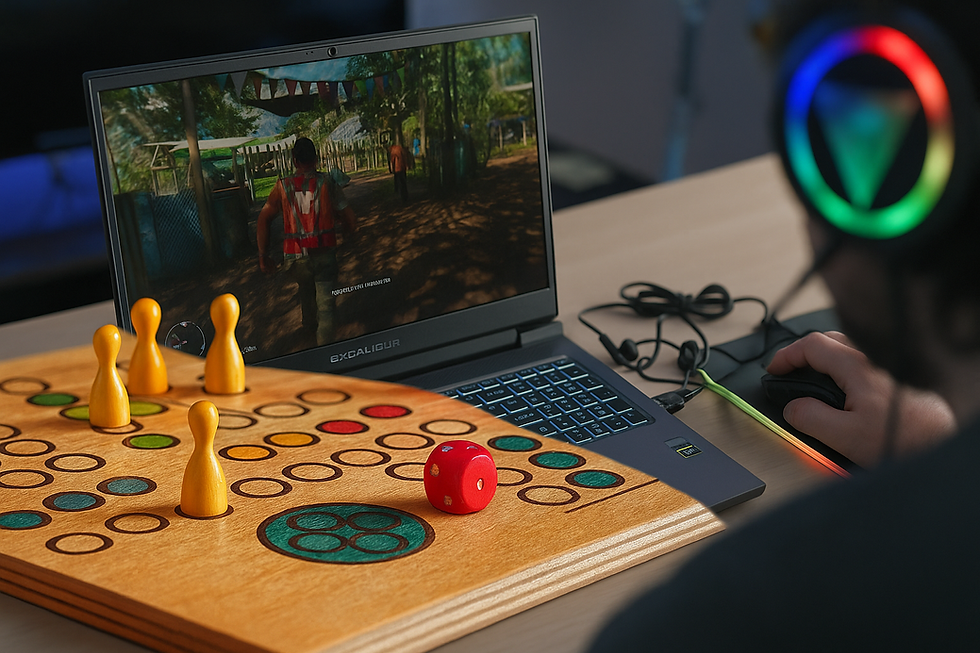How Board Games for Mental Health Strengthen Your Mind
- shahmeerarshad008
- Aug 22, 2025
- 4 min read
Table of Contents
1. Introduction: Why Mental Health Matters in Today’s World
In today’s fast-paced lifestyle, mental health has become one of the most discussed topics worldwide. From stress at work to social isolation, people are searching for natural and enjoyable ways to strengthen their mental resilience. Surprisingly, one of the most effective solutions has been around for centuries—board games for mental health.

These timeless activities do more than just entertain. They bring people together, sharpen focus, and provide much-needed stress relief. Whether you’re a student, a busy professional, or simply someone looking for balance, board games can be a practical and joyful tool to improve your well-being.
2. Board Games for Mental Health: An Overlooked Ally
Stress Relief Through Play
Playing games isn’t just fun—it’s therapeutic. The act of sitting down with a board, focusing on strategy, and forgetting external worries provides a mindful break from daily stress. Games create a “flow state” where players are fully immersed, lowering cortisol levels and easing anxiety.
Boosting Focus and Concentration
Board games demand attention and problem-solving. From planning moves ahead in Chess to adapting strategies in Othello, they train the brain to stay present. These exercises naturally build focus, which translates into better productivity in everyday life.
Strengthening Social Bonds and Emotional Well-Being
Loneliness is a growing problem worldwide, and board games can help. Playing together encourages conversation, laughter, and empathy. Cooperative games especially nurture teamwork, making them powerful tools for social connection and emotional resilience.
3. Classic Board Games That Support Mental Health
Chess: Building Patience and Focus
Chess is often praised for its intellectual challenges, but its benefits for mental health are equally strong. It teaches patience, long-term thinking, and emotional regulation—skills crucial in managing stress and anxiety.
Go: Enhancing Mindfulness and Strategy
The ancient game of Go requires both calmness and creativity. Its slow, meditative pace allows players to think deeply, promoting mindfulness and reducing mental clutter.
Checkers: Simple Gameplay, Big Cognitive Wins
While easier to learn than Chess or Go, Checkers stimulates critical thinking and decision-making. Its simplicity makes it accessible to kids and adults alike, supporting cognitive flexibility in a stress-free environment.
Othello: Shifting Perspectives and Mental Flexibility
Othello (Reversi) challenges players to think from different angles, which is excellent for mental adaptability. This kind of perspective-shifting mirrors healthy cognitive patterns, improving problem-solving in real life.
Cooperative Games: Reducing Anxiety Through Team Play
Unlike competitive games, cooperative board games emphasize teamwork. Titles like Pandemic or Forbidden Island allow players to fight against the game itself, reducing anxiety while fostering a sense of community.
4. Modern Trends in Therapeutic Board Games
Mindfulness-Based Games
Recently, a wave of games has been designed specifically for stress relief and mindfulness. These encourage relaxation, gratitude, and reflection, offering structured yet enjoyable ways to prioritize mental wellness.
Educational Games That Build Confidence
Games designed for learning—whether math puzzles, word-building challenges, or problem-solving tasks—help children develop self-esteem and resilience. The sense of achievement when mastering a skill directly supports mental health.
5. How Board Games Compare to Other Stress-Relief Activities
Unlike passive entertainment such as watching TV, board games require active engagement. This level of participation makes them more effective at training the mind and lifting mood. Compared to meditation or journaling, they provide a playful, social dimension that is often missing in other wellness activities.
6. Making Play a Habit: Tips for Mental Wellness Through Games
Schedule a weekly game night with friends or family.
Choose a mix of strategy and cooperative games to balance focus with relaxation.
Introduce kids early to board games that stimulate their mental growth.
Play digitally when time is short, as many platforms now offer engaging board game experiences online.
7. Conclusion: A Smarter, Healthier Mind Through Play
Board games are more than just entertainment—they are tools for healthier, happier living. By reducing stress, improving focus, and strengthening social bonds, they offer a holistic approach to mental well-being.
In today’s digital age, even traditional board games are evolving. Platforms like Pixply are reviving both timeless classics and hidden gems, bringing them together in one interactive experience. Whether you’re playing Chess, Go, Backgammon, or Checkers, or exploring unique cultural treasures like Baghchal from Nepal, Nine Men’s Morris, or the ancient Royal Game of Ur, the possibilities for mental growth are endless.
With Pixply, these games are no longer confined to history books or dusty shelves—they’re accessible anytime, anywhere, offering not just fun but genuine brain training and mental wellness benefits.



Comments